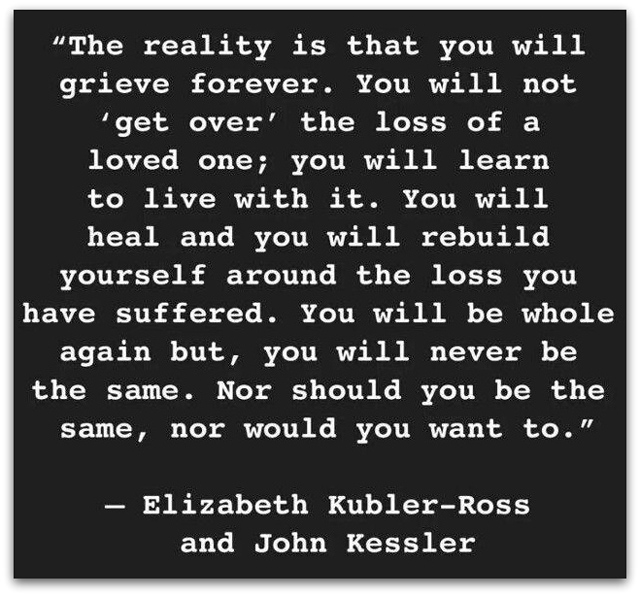|
Ψ Bereavement: the experience of losing a loved one.
Ψ Grief: one's emotional reaction to the death of a loved one.
Ψ The traditional Irish Wake was commonplace in Ireland up until about the 1970's & illustrates one culture's response to the need for the expression of grief. Perhaps a return to this kind of pattern is in order.
FYI: The traditional Irish wake was the process of laying out the body of a departed relative in the house where they lived & /or died. All of the family & quite a few of the deceased ones neighbors & friends would gather at the house. The body was usually in a coffin in the parlor of the house or living room. There would be lots of food & plenty of drink to be consumed. People would come & socialize & remember the departed person's life. This wasn't a time for tears to say the least, it was more of a party than a funeral. It was the traditional Irish way of celebrating one's life & ensuring that they had a good send off.
Ψ Mourning has become more private, less emotional, & less religious than formerly. This is not "good" for resolving grief! See: absent grief below.
• Younger generations of all spiritual backgrounds are likely to prefer small memorial services after cremation, while older generations prefer burial after a traditional funeral.
• There is an increasing tendency towards social isolation for those who have just lost their loved ones. This is exactly the opposite of a healthy reaction.
• A proper mourning should bring sympathy & attention. Grief that lingers can even cause death, primarily from heart disease, cirrhosis, & especially for men, suicide.
• Unexpressed grief also harms the larger community, particularly children: the funeral provides the setting in which private sorrow and public loss can be both expressed and shared as a social ceremony, it serves to bring together the community. It also serves as an important vehicle of cultural transmission.
Ψ Normal grief is a term used to describe the typical symptoms somebody experiences after a
loss. It can include:
• anger.
• feelings of guilt.
• sadness & tearfulness.
• preoccupation with the loss.
• seeing or hearing the voice of the loss one.
• disturbed sleep & appetite &, occasionally, weight loss.
• disbelief, shock, numbness & feelings of unreality.
• Denial, combined with deep waves of sadness
(Joan Didion, The Year of Magical Thinking).
Ψ Complicated types of Grief:
• Absent Grief: A situation in which overly
private people cut themselves off from the community & customs of expected grief; can lead to
social isolation. (not good)
• Incomplete Grief: A situation in which circumstance interfere with the process of
grieving. (not good)
• Disenfranchised Grief: A situation in which certain people,
although they are bereaved are not allowed to mourn publicly. (not good)
• Anticipatory grief: occurs when you know in advance that your loved one is going to die. You start getting ready psychologically, & you begin the grieving process. (may lessen the hurt)
 Grief - common themes & emotional reactions, Three phases: Grief - common themes & emotional reactions, Three phases:
1. Impact - shock, denial, & numbness usually persist from six to eight weeks.
2. Confrontation - react to the loss (i.e., experience the pain).
3. Accommodation / Acceptance
(Bowlby, 1980; Parkes, 1986,1991; Rambo,1995)

 Twelve Ways to Help the Bereaved: Twelve Ways to Help the Bereaved:
• By being there
• By tolerating silences
• By listening in an accepting and non-judgmental way
• Avoid the use of
clichés such as "Think of all the good times",
"You can always have another child" etc.
• By encouraging them to talk about the deceased
• Be practical in your offer of support by minding children or cooking
• By mentioning the dead persons name
• Accept that tears are normal and healthy
• Don't try to fill in conversations with a lot of outside news.
• Remember that grief may take many years to work through
• Acknowledge birthdays, death dates, anniversaries etc.
• By accepting that you cannot make them feel better
• The Centre for Grief Education, McCulloch House, Monash Medical Centre, 246 Clayton Road, CLAYTON VIC 3168 Australia
Epilogue: Death & Dying
Robert C. Gates

|
If angels can see into the ends and beginnings of things,
Why are they still among us
Like widowed birds, circling, circling,
their poor go-betweens at a full stop?
- Charles Wright, Littlefoot
|













